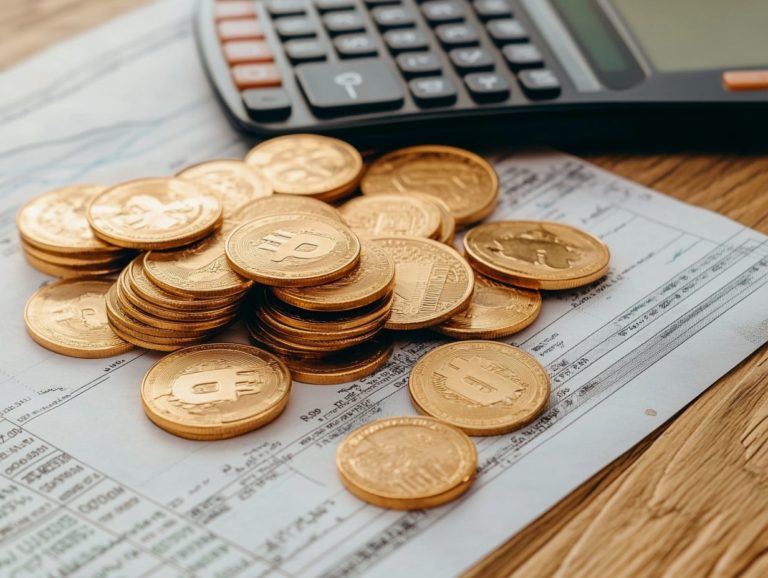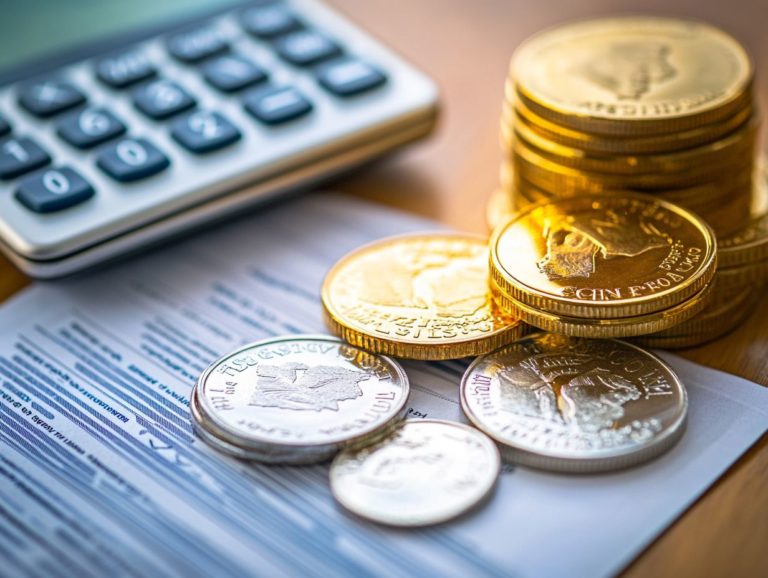The Tax Benefits of Holding Precious Metals in a Trust
In today s financial landscape, securing your wealth is more important than ever. One effective strategy you might consider is establishing a trust to hold precious metals like gold, silver, and platinum.
Let’s explore the definition and purpose of trusts, shedding light on their numerous benefits, including tax advantages and asset protection. You ll discover the various types of precious metals you can include, the steps involved in setting up your trust, and potential risks to keep in mind.
Dive in to uncover how a precious metals trust could be the perfect move for you.
Contents
- Key Takeaways:
- What is a Trust?
- The Benefits of Holding Precious Metals in a Trust
- Types of Precious Metals Allowed in a Trust
- Setting Up a Precious Metals Trust
- Potential Risks and Drawbacks
- Liquidity Concerns
- Trustee Fees and Expenses
- Frequently Asked Questions
- What are the tax benefits of holding precious metals in a trust?
- Do I have to pay taxes on my precious metals while they are held in a trust?
- Can I use a trust to protect my precious metals from inheritance taxes?
- Are there any restrictions on the types of precious metals that can be held in a trust?
- How do I set up a trust to hold my precious metals?
- What are the potential downsides of holding precious metals in a trust?
Key Takeaways:

- Holding precious metals in a trust can provide significant tax advantages, making it a strategic investment option for individuals seeking to minimize tax burdens.
- A precious metals trust can offer asset protection, shielding assets from potential lawsuits or creditors.
- When setting up a precious metals trust, it’s important to carefully consider the types of precious metals allowed and potential risks such as liquidity concerns and trustee fees.
What is a Trust?
A trust is a way to manage assets through a third party, known as a trustee. The trustee holds and manages assets on your behalf, which can range from stocks and bonds and real estate to precious metals like gold and silver.
You might consider setting up a trust for estate planning purposes, as it allows you to outline precisely how your assets will be distributed after your passing. It also offers specific tax implications and advantages under IRS regulations.
This form of asset management is crucial for your investment decisions, especially when it comes to collectibles and physical investments. It ensures that your beneficiaries receive their intended inheritance in a tax-efficient manner.
Definition and Purpose
The concept of a trust is pivotal in managing assets for beneficiaries. It serves various purposes, such as estate planning and asset protection.
In essence, a trust is a legal arrangement where you, as the trustee, hold and manage property or assets on behalf of another party your beneficiary. This setup dictates how your assets are distributed, ensuring that your wishes are honored long after you’re gone.
As a trustee, you bear a fiduciary duty to act in the best interests of the beneficiaries. This involves overseeing the trust’s assets, making informed investment decisions, and ensuring compliance with legal requirements. Strategically utilizing trusts can help you minimize capital gains and tax liabilities, facilitating a more efficient transfer of wealth and safeguarding the financial future of your beneficiaries.
The Benefits of Holding Precious Metals in a Trust
Holding precious metals like gold and silver in a trust presents you with a wealth of advantages, particularly regarding tax benefits and improved investment returns. By strategically utilizing a trust to manage these physical assets, you can significantly reduce your capital gains tax liability.
The asset protection features in trusts safeguard your precious metals, ensuring they remain secure for future generations.
Tax Advantages
The tax advantages of holding precious metals within a trust can offer you significant benefits, especially when managing capital gains. By integrating these assets into a trust structure, you unlock a realm of strategic opportunities that can lead to considerable tax savings.
Trusts can effectively defer capital gains taxes, helping you navigate the intricate IRS rules that govern the sale of precious metals. With the right specialized trust, you may transfer ownership of your metals without triggering immediate capital gains liabilities. Additionally, understanding the tax benefits of precious metals in retirement accounts can further enhance your financial strategy.
Utilizing strategies such as a charitable remainder trust or a dynasty trust can provide tax benefits while facilitating the transfer of wealth across generations. Grasping these options is essential for anyone eager to optimize their tax situation while ensuring compliance with IRS regulations.
Ever wondered how to effectively safeguard your investments? Let s find out together!
Take the next step to secure your wealth today!
Asset Protection
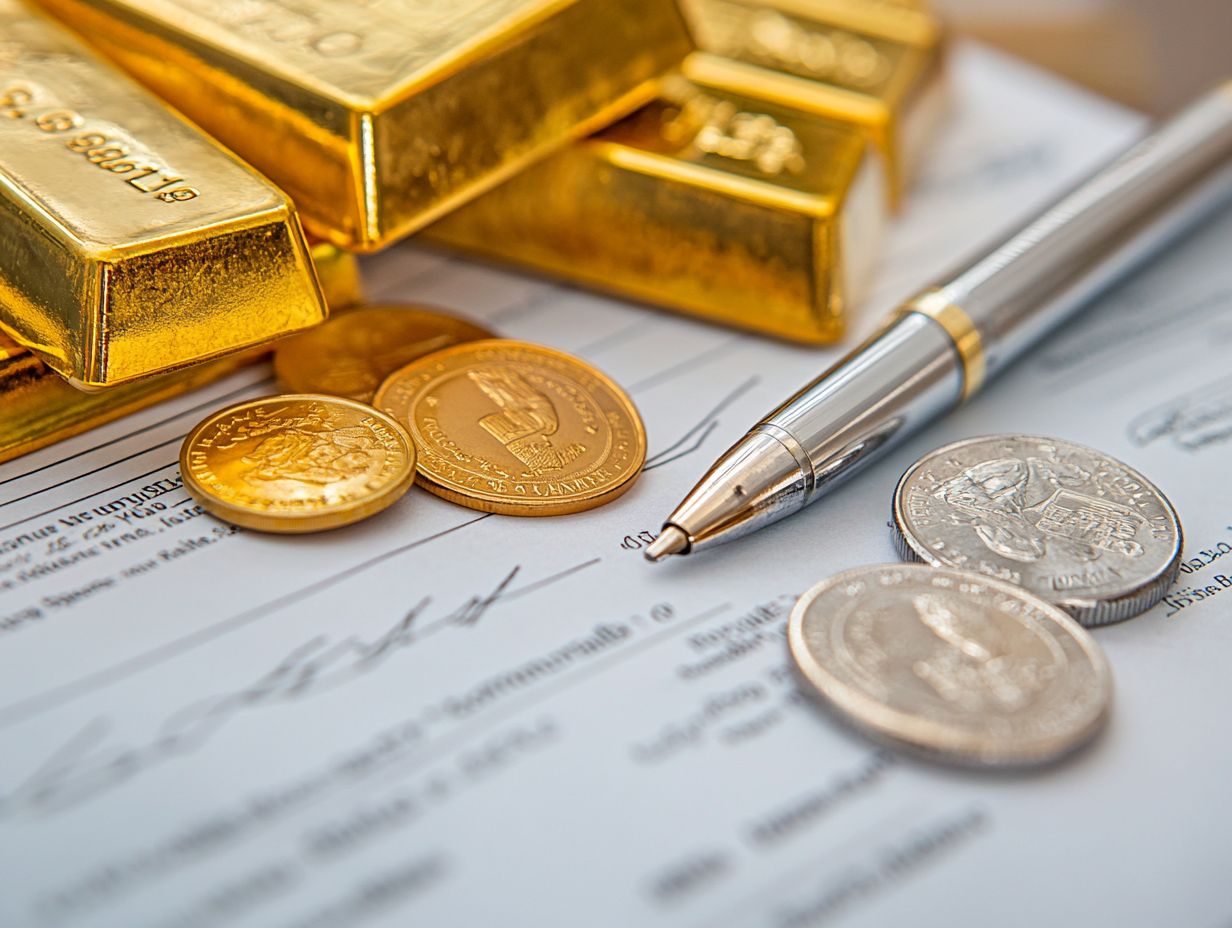
Asset protection is a key benefit of placing your precious metals in a trust. It safeguards them from market fluctuations and legal claims.
This step creates a barrier against creditors. Your hard-earned assets can remain secure even during legal disputes.
A well-structured trust protects your gold and silver. It also helps distribute your assets strategically according to your financial goals.
You should explore asset protection strategies like irrevocable trusts or family limited partnerships. These options can enhance your security and help manage your wealth effectively.
Types of Precious Metals Allowed in a Trust
You can hold various precious metals in a trust, including gold, silver, platinum, and other bullion. These assets are valuable investments that help diversify your portfolio.
Gold, Silver, Platinum, and More
Gold, silver, and platinum are prime choices for trusts. Each has unique investment risks and market values.
Gold often acts as a safe haven during economic uncertainty. It has a strong track record of preserving value.
Silver is known for its industrial use and price accessibility. Its value can fluctuate significantly based on market demand and investor sentiment.
Platinum is rarer and important in industries like automotive manufacturing. Understanding how these metals react to market changes can help you assess their investment potential.
Setting Up a Precious Metals Trust
Setting up a precious metals trust requires careful planning. You need to follow strategic steps to comply with IRS regulations and improve asset protection.
Steps and Considerations
Establishing a trust involves understanding IRS rules and investment strategies. Start by identifying the type of trust that matches your goals.
Consult legal and financial experts to ensure compliance with laws. This includes understanding which assets can be included and gathering necessary documentation.
Ongoing management is critical. Keep diligent records of your investments and distributions to avoid tax liabilities.
Potential Risks and Drawbacks
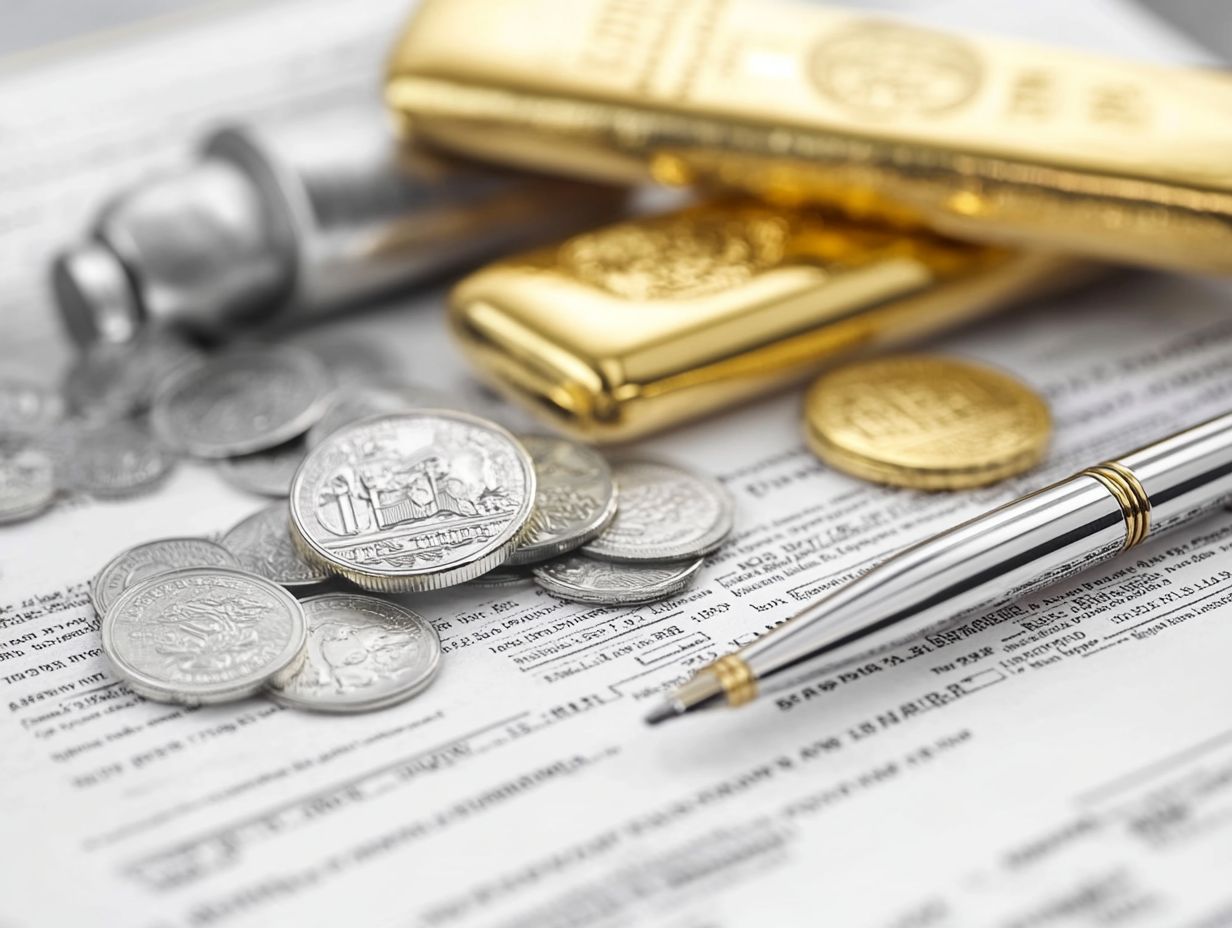
While a trust provides many advantages, consider potential risks and drawbacks. Liquidity concerns and trustee fees are important factors.
Being aware of these issues will help you make informed investment decisions.
Liquidity Concerns
Liquidity concerns are crucial when investing in precious metals held in a trust, especially with gold and silver.
The unique qualities of these metals can create challenges when you need to convert them into cash quickly. Selling precious metals involves finding buyers, checking market conditions, and negotiating prices, unlike stocks or bonds, which can be traded instantly.
You might face delays or unfavorable pricing, especially during market downturns or in less liquid environments. Act fast to ensure you can sell your metals when you need cash!
To navigate these hurdles, maintain a diversified investment portfolio a mix of different investments to reduce risk and include cash reserves to ensure immediate liquidity when needed.
Partnering with reputable dealers or platforms that specialize in precious metals can simplify the selling process. This partnership can give you quicker access to cash without compromising your investment’s long-term stability.
Trustee Fees and Expenses
Trustee fees and associated expenses can significantly impact your investment returns within a precious metals trust.
You need to know that these charges cover various costs, including management fees for overseeing and administering the trust. Expenses for storing precious metals also add to your costs.
This accumulation of fees diminishes your net gains and may require adjustments to your investment strategy. Understanding these costs is essential for effective long-term financial planning and meeting your investment objectives.
Frequently Asked Questions
What are the tax benefits of holding precious metals in a trust?
Holding precious metals in a trust can defer taxes on any gains until the metal is sold, potentially lowering your overall tax rate on those gains.
Do I have to pay taxes on my precious metals while they are held in a trust?
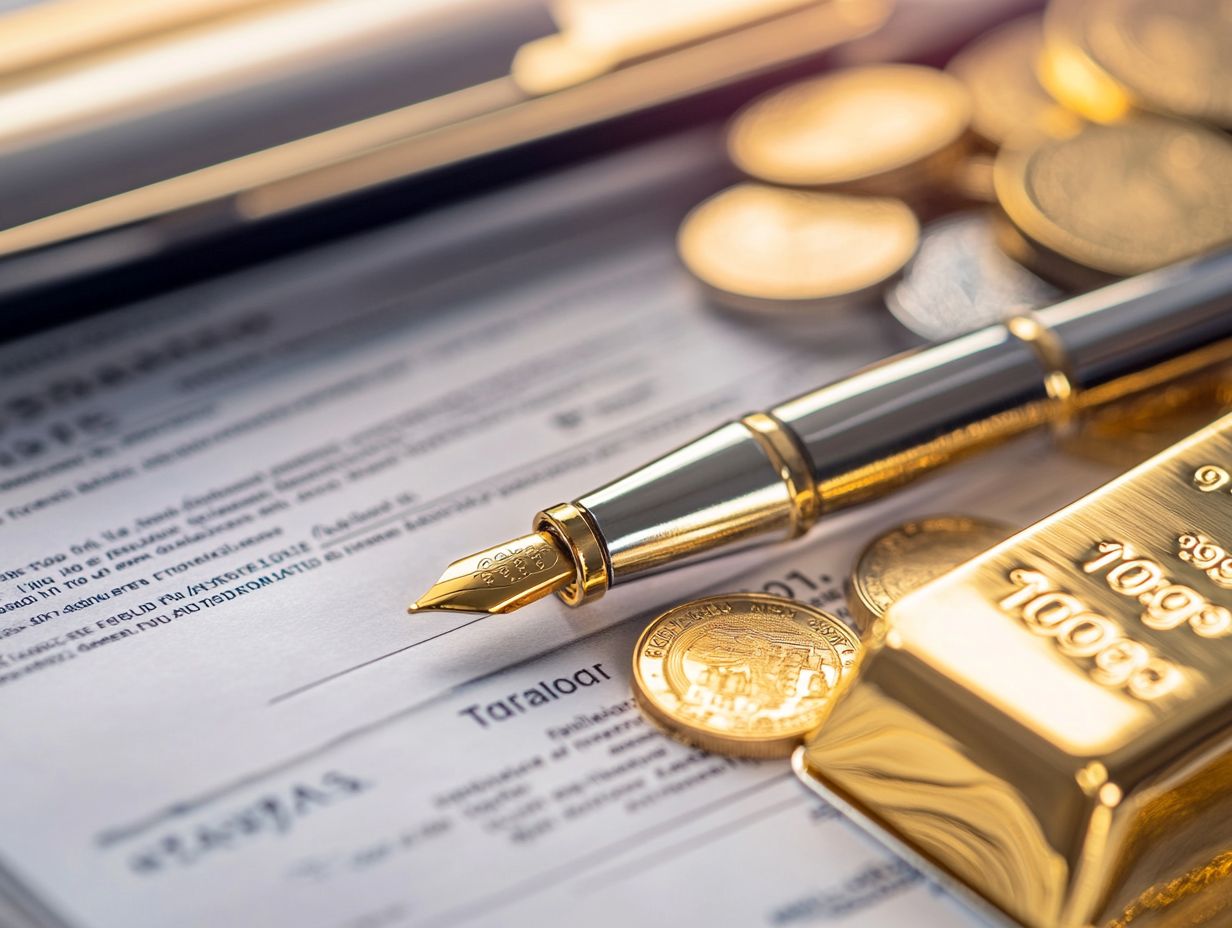
No, you do not have to pay taxes on your precious metals while they are held in a trust. This offers a tax-deferred investment option for those aiming to minimize their tax burden.
Can I use a trust to protect my precious metals from inheritance taxes?
Yes! Using a trust to hold your precious metals can protect them from inheritance taxes, as the trust becomes the legal owner of the assets and can pass them on to beneficiaries without incurring additional taxes.
Are there any restrictions on the types of precious metals that can be held in a trust?
No, there are no restrictions on the types of precious metals that can be held in a trust. This includes gold, silver, platinum, and palladium in various forms such as coins, bars, or bullion.
How do I set up a trust to hold my precious metals?
To set up a trust for your precious metals, work with a qualified attorney or financial advisor who can guide you through legal and tax implications. They will help you determine the best type of trust for your situation.
What are the potential downsides of holding precious metals in a trust?
One potential downside is the cost of setting up and maintaining a trust, along with any management fees. Additionally, there may be restrictions on accessing the precious metals until a certain time or event occurs, depending on the trust’s terms.
Get started on setting up your trust today!












